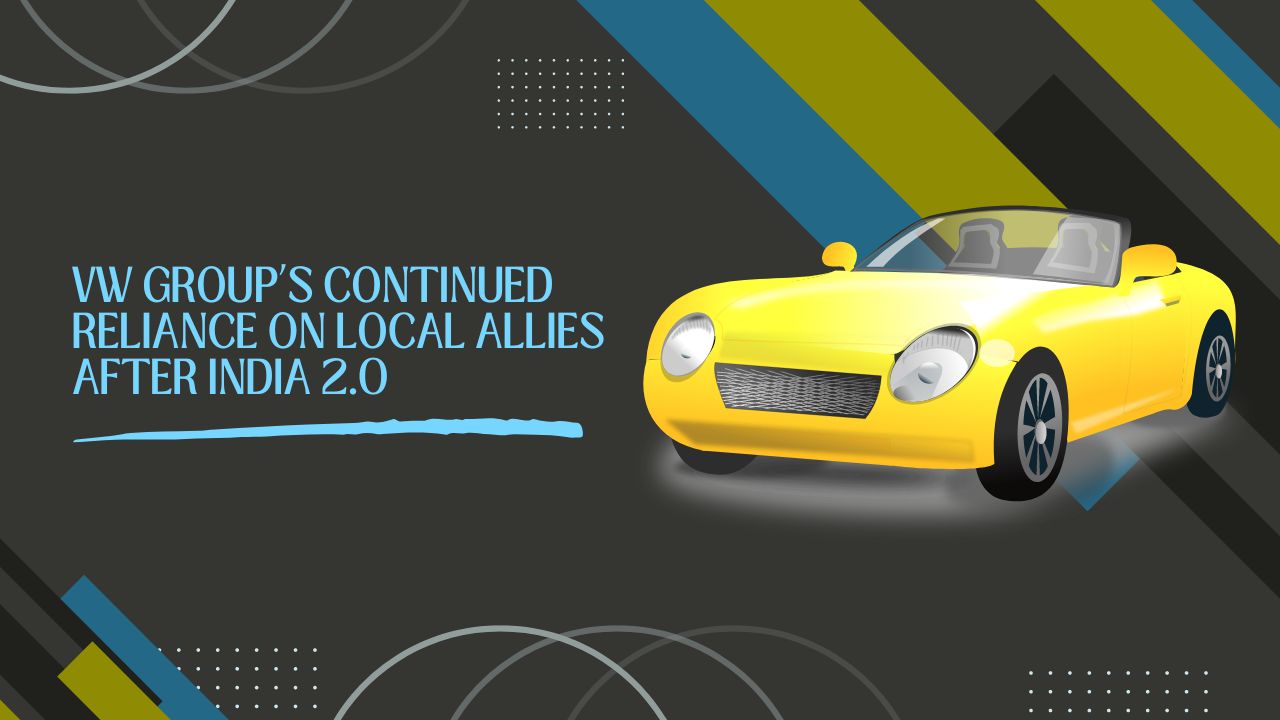The Volkswagen Group, one of the world’s leading car manufacturers, has entered the Indian market in a big way with its India 2.0 plan. The plan, which focuses on creating new vehicles that suit local needs and culture, is a milestone in Volkswagen’s efforts to capture a larger share of the Indian market. However, despite India 2.0’s progress, Volkswagen Group’s reliance on local partners remains critical. That’s why local partnerships are crucial to Volkswagen’s success in India.
 VW Group’s Continued Reliance on Local Allies After India 2.0
VW Group’s Continued Reliance on Local Allies After India 2.0 Understanding India 2.0
India 2.0 was launched with a clear goal: to revive Volkswagen’s business in India by developing new cars tailored for the region. The main components of this program are:
Local manufacturing: Building new manufacturing facilities in India to produce vehicles locally, thereby reducing costs and increasing competitiveness.
Market-specific vehicles: Developing vehicles such as small SUVs and cars that meet the needs and wants of Indian consumers.
Strategic investments: investment of over 1 billion euros in the Indian market to support research, development, and construction.
India Achievement 2.0
The India 2.0 project has achieved several milestones:
Newly launched models: the Volkswagen Taigun, Skoda Kushaq, and other models were launched and were very popular among Indian consumers.
Improved location: the greater the location of the components, the higher the cost of the operation and the better the coordination with local supply chains. Greater brand influence: Increase brand awareness and market share through key marketing and targeted products.
I need a spouse
Despite the success of India 2.0, Volkswagen Group’s reliance on local partners is important for the following reasons:
Navigating the Regulatory Environment: The regulatory environment in India is complex and ever-changing. Local partners can help communities follow these laws more effectively, ensuring compliance and mitigating risks.
Understanding consumer preferences: Local partners have a deep understanding of Indian consumer behavior, preferences, and trends. This knowledge is important in developing products and marketing strategies that will appeal to local consumers. Supply Chain Management: Building a strong and efficient supply chain is critical to success. Local partners can tap into existing networks of suppliers and distributors, ensuring a more efficient and reliable supply chain.
Build Brand Trust and Loyalty: Partnering with local brands can boost Volkswagen’s credibility and appeal among Indian consumers, thereby fostering brand loyalty and success for a long time.
After-Sales Service and Support: Ensuring high-quality after-sales service is essential to maintaining customer satisfaction. Local partners can provide the necessary infrastructure and expertise to deliver high-quality service and support.
Strategic cooperation
Volkswagen has made significant progress in building strategic alliances in India.
Mahindra & Mahindra: Volkswagen has partnered with Mahindra & Mahindra to explore collaborations and technology sharing, particularly in the electric vehicle (EV) segment. The alliance aims to leverage Mahindra’s regional expertise and Volkswagen’s technological excellence.
Tata Motors: Although initial discussions with Tata Motors did not result in a formal partnership, the discussions indicated Volkswagen’s recognition of the importance of regional partnerships.
Skoda Auto: As part of the India 2.0 initiative, Skoda Auto India will play a key role in leading Volkswagen’s operations by leveraging its presence and knowledge.
Future perspectives and challenges
Going forward, the Volkswagen Group’s reliance on local partners will help address several challenges:
Electric Vehicle Transition: As India moves towards electric vehicles, local partners will play an important role in developing and deploying electric vehicle infrastructure and understanding consumer adoption patterns.
Competition: The Indian car market is highly competitive, with both domestic and foreign manufacturers fighting for market share. Local partners can gain a competitive advantage through their market and customer base.
Economic
Integration: Addressing economic volatility and uncertainty requires local knowledge and adaptive strategies, which local partners are well positioned to provide.
The India 2.0 plan has laid a solid foundation for the development of the Volkswagen Group in India. However, continuing to rely on local partners is not only beneficial but also essential for navigating the complexities of the Indian market. By establishing strategic partnerships, Volkswagen can better understand the needs of local consumers, simplify its supply chain, and increase brand influence. As the automotive industry continues to grow, these regional partnerships are key to Volkswagen’s continued success and expansion in India and beyond.